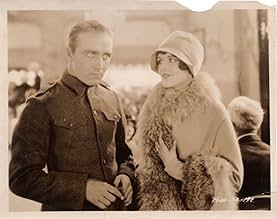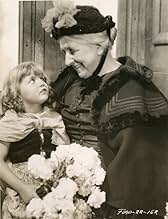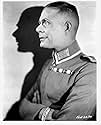A family saga in which three sons of a Bavarian widow go to war for Germany and the fourth goes to America, Germany's eventual opponent.A family saga in which three sons of a Bavarian widow go to war for Germany and the fourth goes to America, Germany's eventual opponent.A family saga in which three sons of a Bavarian widow go to war for Germany and the fourth goes to America, Germany's eventual opponent.
- Awards
- 3 wins total
Frank Baker
- Soldier
- (uncredited)
George Blagoi
- Officer
- (uncredited)
Stanley Blystone
- Officer
- (uncredited)
Carl Boheme
- Officer
- (uncredited)
Constant Franke
- Officer
- (uncredited)
Featured reviews
John Ford is truly great filmmaker this is the pinnacle (well in my opinion) of silent film. Margaret Mann is a revelation her performance is so enthralling especially in some of the final scenes at the end of the picture.
The story is a strong one but the direction and the way it is put together is truly sensational Ford himself is Irish and this film i feel may be close to his roots.
I was amazed the film didn't have many title cards however it was so simple to follow and by the end of it you're moved by mann's performance. you feel and care for the characters the whole way through that's the mark of a great film.
And for the film buffs watch the early scenes in the film you got to love the tracking shot the mark of master John Ford
The story is a strong one but the direction and the way it is put together is truly sensational Ford himself is Irish and this film i feel may be close to his roots.
I was amazed the film didn't have many title cards however it was so simple to follow and by the end of it you're moved by mann's performance. you feel and care for the characters the whole way through that's the mark of a great film.
And for the film buffs watch the early scenes in the film you got to love the tracking shot the mark of master John Ford
Sentimental, but not mawkish, the early John Ford silent, "Four Sons," is a well made film that exemplifies early 20th century values. The four sons of a Bavarian widow are swept up in the events of World War I. Three of the boys fight for the Kaiser, while the fourth, who had emigrated to the United States, is on the opposite side. The screenplay does not dwell on politics, although the German officers have villainous characters, and the American son chastises an employee for advocating war, because "America is neutral." Most of the action takes place in a small village in Bavaria, and the unspoken message is that ordinary Germans are as kind and feeling as people everywhere.
Despite a predictable storyline, the performances avoid the "grand style" that gave silent acting a bad name. Made in 1928 at the apogee of the American silent era, John Ford's direction is solid, and the film foreshadows his adaptation of "How Green Was My Valley" more than a decade later. Certainly the two strong mothers who suffer the absence of their sons have much in common. If John Ford had not directed "Four Sons," the film could have been largely forgotten. Plot holes abound, and coincidences occur that "only happen in the movies." However, the film is a good example of popular entertainment in the late silent era, and modern audiences will likely be engaged, especially students of Ford and those with an affection for silent movies.
Despite a predictable storyline, the performances avoid the "grand style" that gave silent acting a bad name. Made in 1928 at the apogee of the American silent era, John Ford's direction is solid, and the film foreshadows his adaptation of "How Green Was My Valley" more than a decade later. Certainly the two strong mothers who suffer the absence of their sons have much in common. If John Ford had not directed "Four Sons," the film could have been largely forgotten. Plot holes abound, and coincidences occur that "only happen in the movies." However, the film is a good example of popular entertainment in the late silent era, and modern audiences will likely be engaged, especially students of Ford and those with an affection for silent movies.
10finki
This classic John Ford masterpiece has been spoiled by bureaucratic incompentece.
Somebody in 20th Century-Fox has decided to remove the original Movietone soundtrack and replace it with an inappropriate score. it seems that for certain people, the original intentions of director John Ford were no good enough for today. Hence, the film was stripped of its sound... which means that we do not have the film as it was originally intended to be seen.
Even though in most parts of the world, as well here in the United States, most people saw the film in a silent version, the original soundtrack is a crucial element of the film and without it, the experience is incomplete.
A great film, but avoid the DVD until an authentic restored version with the original soundtrack becomes available.
Somebody in 20th Century-Fox has decided to remove the original Movietone soundtrack and replace it with an inappropriate score. it seems that for certain people, the original intentions of director John Ford were no good enough for today. Hence, the film was stripped of its sound... which means that we do not have the film as it was originally intended to be seen.
Even though in most parts of the world, as well here in the United States, most people saw the film in a silent version, the original soundtrack is a crucial element of the film and without it, the experience is incomplete.
A great film, but avoid the DVD until an authentic restored version with the original soundtrack becomes available.
Other than The Iron Horse we rarely see John Ford's silent films. But in viewing Four Sons we can certainly spot a lot of stylistic traces and themes that mark Ford's more well known sound films.
Before The Iron Horse Ford was a director of Grade B westerns mostly starring Harry Carey. After The Iron Horse Ford started doing other kinds of films. A story with a German setting one might think would be unusual for Ford, but you examine it closely this film is as sentimental as any of his Irish films. And Margaret Mann who played the mother of the Four Sons was a harbinger of such later mother characters in Ford films as Olive Carey, Irene Rich, and the grandmama of them all, Jane Darwell.
Watch also how Ford handles the military sequences in both the German and American settings. The cultural differences are there, but the military way is universal. John Wayne is listed in a bit role as an Officer and I think I spotted him during a scene at a railway station where a particularly nasty Teutonic major played by Earle Foxe. Wayne I believe is one of his aides.
The story is a simple one Margaret Mann is a widow with four grown sons in a village in Bavaria. The sons are James Hall, Charles Morton, Ralph Bushman, and George Meeker. Hall has been in communication with a friend in America urging him to emigrate from Germany and he does. Hall does achieve the American dream, opening a successful business, marrying June Collyer and giving Mann her first grandchild. Then World War I comes and that's the rest of the story as Paul Harvey used to say.
Four Sons holds up well even after 80+ years. Mann's trials and tribulations as a mother certainly is a universal theme. And the ending is as happy and sentimental one as John Ford ever devised in any of his films.
Before The Iron Horse Ford was a director of Grade B westerns mostly starring Harry Carey. After The Iron Horse Ford started doing other kinds of films. A story with a German setting one might think would be unusual for Ford, but you examine it closely this film is as sentimental as any of his Irish films. And Margaret Mann who played the mother of the Four Sons was a harbinger of such later mother characters in Ford films as Olive Carey, Irene Rich, and the grandmama of them all, Jane Darwell.
Watch also how Ford handles the military sequences in both the German and American settings. The cultural differences are there, but the military way is universal. John Wayne is listed in a bit role as an Officer and I think I spotted him during a scene at a railway station where a particularly nasty Teutonic major played by Earle Foxe. Wayne I believe is one of his aides.
The story is a simple one Margaret Mann is a widow with four grown sons in a village in Bavaria. The sons are James Hall, Charles Morton, Ralph Bushman, and George Meeker. Hall has been in communication with a friend in America urging him to emigrate from Germany and he does. Hall does achieve the American dream, opening a successful business, marrying June Collyer and giving Mann her first grandchild. Then World War I comes and that's the rest of the story as Paul Harvey used to say.
Four Sons holds up well even after 80+ years. Mann's trials and tribulations as a mother certainly is a universal theme. And the ending is as happy and sentimental one as John Ford ever devised in any of his films.
In late 1920s Hollywood there was a brief craze for German cinema, especially at Fox, who had recently appropriated FW Murnau. It was no surprise then that, as well as bringing over the genuine article, the studios would also begin cranking out a few pictures that were Germanic in setting if not in style. Four Sons also takes advantage of the trend for World War pictures after the success The Big Parade.
As well as directing Four Sons, John Ford was also the producer, which is bit of a mixed blessing. With the director allowed greater executive control you get all the best and worst of the free-range Ford. As has often been remarked, Ford had "economy of expression" that is, the ability to convey information and story in as few shots as possible. The flipside of this however is that he did tend to get bogged down with comedy scenes, or in this case restating and reinforcing the sense of rural simplicity and family unity until it becomes more monotonous than moving. The comic moments are particularly weak in this picture just fat men with moustaches and Prussians with monocles being stereotypically Teutonic.
But one great advantage of having Ford as producer is that the picture is relatively free from unnecessary intertitles. All the great silent directors were of course skilled visual storytellers and Ford is no exception, and of course different screenwriters vary in their wordiness, but the frequency and necessity of intertitles would ultimately be down to whoever was in overall charge of the production. Ford has here cut down the title cards to a minimum, and so we get some great little moments such as the postman turning the first letter over in Mother Bernle's hands to let us know that she cannot read, or the villagers approaching the postman to find out if is their family who is to receive the black envelope moments which would have been ruined by a load of intertitles in many other productions of this era.
And the visual style of Ford's pictures was by now more or less fully developed. It's interesting to see here how in Ford's world there is no midpoint between town and country. We don't see, for example, the village framed by surrounding hills or fields, or even against the sky. The village itself is the frame and the background, as if to make it an enclosed and totally civilized space. In contrast, whenever Ford shot a scene out in the wilderness he emphasised its openness although Four Sons never really gets out in the open air so you don't see that here.
While Four Sons may be somewhat awash with sentimentality, Ford's simplistic approach of showing the tenderest moments with delicate shot composition does at least allow the picture some dignity. For example, he uses the overhead light to throw an almost heavenly glow over the family meal scene, then later echoes this with the shot of Mother Bernle grieving in a shaft of daylight. The most effective shot of all though is when Joseph says goodbye to his wife before going off to war. Ford goes against convention by filming the couple from behind in long shot, and the beauty of this moment almost makes me forgive all the other flaws of the picture. It's also a good decision not to show their faces, because James Hall was not a particularly good actor, as we can see in the scene where he returns home again.
In spite these touches of brilliance, the picture as a whole is weakened because it continually bombards us with either sentiment or tragedy. Of course, cinema would be dull indeed without poignancy, but poignancy only works in small doses. Saturate a picture in emotions and the individual tugs lose impact. Four Sons is a good work for Ford the director, but this fact doesn't quite save it from the poor judgment of Ford the producer.
As well as directing Four Sons, John Ford was also the producer, which is bit of a mixed blessing. With the director allowed greater executive control you get all the best and worst of the free-range Ford. As has often been remarked, Ford had "economy of expression" that is, the ability to convey information and story in as few shots as possible. The flipside of this however is that he did tend to get bogged down with comedy scenes, or in this case restating and reinforcing the sense of rural simplicity and family unity until it becomes more monotonous than moving. The comic moments are particularly weak in this picture just fat men with moustaches and Prussians with monocles being stereotypically Teutonic.
But one great advantage of having Ford as producer is that the picture is relatively free from unnecessary intertitles. All the great silent directors were of course skilled visual storytellers and Ford is no exception, and of course different screenwriters vary in their wordiness, but the frequency and necessity of intertitles would ultimately be down to whoever was in overall charge of the production. Ford has here cut down the title cards to a minimum, and so we get some great little moments such as the postman turning the first letter over in Mother Bernle's hands to let us know that she cannot read, or the villagers approaching the postman to find out if is their family who is to receive the black envelope moments which would have been ruined by a load of intertitles in many other productions of this era.
And the visual style of Ford's pictures was by now more or less fully developed. It's interesting to see here how in Ford's world there is no midpoint between town and country. We don't see, for example, the village framed by surrounding hills or fields, or even against the sky. The village itself is the frame and the background, as if to make it an enclosed and totally civilized space. In contrast, whenever Ford shot a scene out in the wilderness he emphasised its openness although Four Sons never really gets out in the open air so you don't see that here.
While Four Sons may be somewhat awash with sentimentality, Ford's simplistic approach of showing the tenderest moments with delicate shot composition does at least allow the picture some dignity. For example, he uses the overhead light to throw an almost heavenly glow over the family meal scene, then later echoes this with the shot of Mother Bernle grieving in a shaft of daylight. The most effective shot of all though is when Joseph says goodbye to his wife before going off to war. Ford goes against convention by filming the couple from behind in long shot, and the beauty of this moment almost makes me forgive all the other flaws of the picture. It's also a good decision not to show their faces, because James Hall was not a particularly good actor, as we can see in the scene where he returns home again.
In spite these touches of brilliance, the picture as a whole is weakened because it continually bombards us with either sentiment or tragedy. Of course, cinema would be dull indeed without poignancy, but poignancy only works in small doses. Saturate a picture in emotions and the individual tugs lose impact. Four Sons is a good work for Ford the director, but this fact doesn't quite save it from the poor judgment of Ford the producer.
Did you know
- TriviaThe film set a permanent attendance record at New York's Roxy Theater
- GoofsIn the New York City sequences, which take place immediately after World War I (1919-1920), all of the women's fashions are strictly in the style of 1928, and all of the automobiles are of late-1920s design.
- Quotes
The Schoolmaster: Books, Herr Postman, are friends that never deceive,
- ConnectionsFeatured in Hollywood (1980)
- SoundtracksLittle Mother
(1928) (uncredited)
Music by Erno Rapee
Lyrics by Lew Pollack
Sung by Harold Van Duzee and the Roxy Male Quartette
Details
Box office
- Gross US & Canada
- $3,270,000
- Runtime
- 1h 40m(100 min)
Contribute to this page
Suggest an edit or add missing content






































